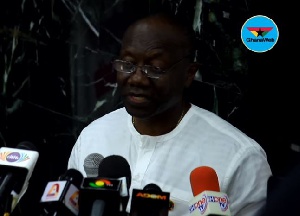 Finance Minister, Ken Ofori-Atta
Finance Minister, Ken Ofori-Atta
Ghana’s domestic revenue mobilisation has almost doubled since 2016 despite the scrapping of some nuisance taxes, Finance Minister Ken Ofori-Atta has said.
At a forum organised by think tank Danquah Institute on Friday, 10 May 2019, Mr Ofori-Atta said: “Domestic revenue collection has seen a significant rise from 11 per cent (GHS24, 283.5 million) of GDP in 2016 to 13 per cent in 2019 (GHS45, 270.2)”.
“This has been achieved after abolishing some 17 nuisance taxes”, he pointed out.
According to him, “The decision last month to reduce duties on imports, may be seen as denying the state much-needed revenue”, explaining that: “We do not see it that way. We measured the cost of under-invoicing and the cost on retail-pricing against the cost of lower duties to the Treasury and concluded in favour of the latter”.
“On a whole”, Mr Ofori-Atta noted, “Taxes here are very low in comparison with that of our peers”.
Buttressing his point with examples, he said: “Tunisia’s tax-to-GDP ratio in 2018 stood at 29.4 per cent, and South Africa recorded a tax-to-GDP ratio of 28.6 per cent that same year”.
He noted that: “Ghana’s tax-to-GDP ratio in 2018 was a mere 13.5 per cent, well below the regional average of 15.5 per cent. With such low tax-to-GDP ratios, we should be concerned about how to move Ghana beyond aid and loans, which are less predictable and costly, than tax revenue”.
“It will be unreasonable on the part of responsible Ghanaian citizens to demand economic transformation, if we can’t make domestic tax revenues a significant source of development finance for our country”, Mr Ofori-Atta added.
Mr Ofori-Atta assured Ghanaians that the government will police their taxes to ensure that they are not used to feed corruption.
“While we plead with Ghanaians to respond to their civic duties by paying their taxes, we want to assure you that my staff at the Ministry of Finance and I, will protect the public purse with uncompromising courage, integrity, fortitude and love for country. Over the last two-and-a-half years, we have reviewed contracts and saved the nation hundreds of millions of Ghana Cedis in the process. We are scrutinising contracts better and negotiating better, too. Also, it is worth restating that the Public Procurement Authority has been able to save about GHS2 billion in two years. Not a single pesewa was saved by the PPA during a similar period under the previous government.
“For far too long, we have ignored the importance of a broad tax base for Ghana’s development. We have neglected the informal sector in our attempts at boosting domestic revenue mobilisation. Governments in the past accepted that mobilising taxes from the informal sector was difficult and very expensive.
“This clearly calls for a rethink on how government extracts tax revenue from the informal sector. The obvious truth is that our formal sector can no longer keep carrying the burden of the informal sector. But, the trouble is in our own understanding of what constitutes the ‘informal’ sector.
“Often when we talk about the informal sector, we look at the woman who sells kofi brokeman at the roadside or the one operating out of the container or the hawker in the streets. But, really, as far as the taxman is concerned, wearing a suit and having a business card are not the stuff that qualify you as being part of the formal sector. It is how you live up to your tax obligations.
How many Ghanaians are registered with SSNIT? Although we have seen a marked improvement in SSNIT contributions from GHS280 million in 2016 to GHS486 million in 2019, how many Ghanaians are on SSNIT or how many Ghanaians who consider themselves responsible citizens do also consider their employees as also worthy of a decent pension and therefore make their SSNIT contributions?”
“There are many lawyers out there, accountants, respectable consultants, PhD holders, big businessmen, who simply refuse to declare their incomes. They have the resources and knowledge to make their fair contribution but simply refuse to pay their taxes and yet will shout the loudest on social media and any given forum about how Government is failing in delivering public services. Such men and women are all around us, unfortunately”, the minister added.